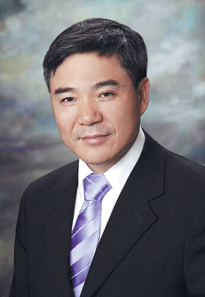
Chinese-American statistician and financial econometrician Fan Jianqing has offered China his knowledge over the past two decades to help the country make rapid progress in statistical research and applications.
Fan was just 15 when he was admitted to the Department of Mathematics at Shanghai's Fudan University in 1982.
"Back then, I was too young," he said. "I always felt that mathematics seemed to be abstract, and I didn't understand the relationship between it and society."
Insisting that research "be useful to society", Fan was then admitted to the Chinese Academy of Sciences' Institute of Applied Mathematics to study for a master's in statistics.
"I felt that communication between mathematics and society could be achieved through statistics," he said.
At that time, other countries, especially the United States, led research in statistical studies and their practical application. In 1986, Fan decided to embark on further study overseas and enrolled at the University of California, Berkeley, to pursue a doctorate.
After receiving his PhD, he began his teaching career. He is now a professor at Princeton University.
In his years of studying and teaching abroad, Fan became increasingly aware of the statistical research gap between China and some other countries. He hoped statistics could be considered an important subject in China and develop rapidly.
His work on statistical machine learning has also been recognized by the Committee of Presidents of Statistical Societies, which gave him its Presidents' Award in 2000, one of the highest prizes in statistics, given annually to an outstanding statistician under the age of 40.
Fan's achievements are inseparable from the principle he holds most dear.
"The topic of research must have certain social importance," he said. "This kind of research can solve real problems that make a difference to people's lives on the one hand. It can also contribute to the development of the subject itself on the other hand. Only in this way can we promote comprehensive development."
Fan travels regularly between the US and China, and has long made research cooperation with Chinese colleges and institutes a priority, sparing no efforts in promoting education and research on statistics, finance and big data in the country. At his urging, the government established the Center for Statistical Research at CAS in Beijing in 2005.
"This is what I could offer and how I express my gratitude to my homeland," Fan said.
In 2015, Fan became dean of the School of Data Science at Fudan University, dedicated to cultivating more Chinese graduate students in statistics and finance, developing the theories, methods and applications of big data, and promoting the development of the big data industry in China.
Fan said scientific research conditions in China were far more advanced than before, and he has been impressed by the achievements Guizhou province has made in advanced technology, especially the application of big data in the real economy, rural reconstruction, livelihood services and social governance.
"China has striven to develop its big data industry and has introduced data centers from multiple advanced IT companies such as Apple and Tencent, providing data resources for its artificial intelligence industry," he said.
"Because China is a late starter in relevant research, there is still a gap compared with other countries. But the development of statistics and big data in China has a bright future."

